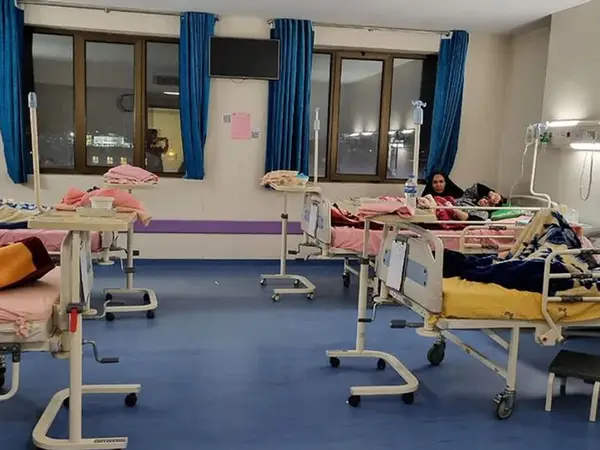Iran's state television aired the so-called ‘confessions’ of a man and his daughter arrested and accused of attacking schools in southern Iran with N2 gas canisters.
The video first shown by the local channel of the state broadcaster (IRIB) in Fars Province in southern Iran showed a girl sitting with her back to the camera being interrogated by a man. Authorities routinely arrange for forced confessions on TV.
The girl says in the video that she obtained the nitrogen gas canisters from a friend and together with her father, a hospital worker, threw them in the courtyards of seven different schools and went to hospitals to film the victims to post the videos as Instagram stories and posts.
For three months, girls’ schools have been targeted by unknown people with some kind of chemical agents, sending hundreds of students to hospital. The government has not arrested the real culprits of the large-scale operation.
Authorities who initially tried to attribute the children’s illness to psychogenic factors have so far not released any details about the chemical agents used in school attacks across the country, which some poisoned students have described as smelling like putrid fruit, or shown any canisters or other vessels used for holding these chemicals.
Many ordinary Iranians have been suspicious of involvement of the regime itself, or religious extremists protected by the regime, in the school attacks and call the acts “state terrorism”.
IRIB news bulletin including forced statements of a young woman arrested for school attacks in Larestan
“I tagged Iran International TV,” the unnamed girl tells her interrogator in the video shown by the state television and claims that by reporting the incidents she wanted to cause negative feelings about the regime in people’s minds.
On Monday, for the first time since the first attack Supreme Leader Ali Khamenei addressed the issue. “If there are really hands at work, or individuals or groups that are involved in this, this will be a huge crime that cannot be overlooked,” he said, adding that culprits should be given maximum punishment for their crime.
The interior ministry in a statement Wednesday said some individuals had been arrested in Khuzestan, West Azarbaijan, Fars, Kermanshah, Khorasan and Alborz provinces. No one has yet been arrested in the religious city of Qom, where the first attack was reported on November 31. Since then, 29 more schools have been attacked in the same city.
Victims of school gas poisoning attacks outside a school in Larestan Monday
Spokesman of Law Enforcement Forces (Faraja), Brigadier General Saeed Montazerolmahdi, said Friday that a team of two men, 50 and 22, and three girls including a 21-year-old who still attended high school, were arrested for the poisonings in Larestan, for which the girl was made to confess on television.
The police chief alleged that the accused had also made recordings of the school attacks and sent it to “hostile media including Iran International TV”. He claimed that the accused girls confessed they wanted to create an atmosphere of insecurity in schools and defame the Islamic Republic.
On Thursday the head of the justice department of Kordestan Province, Seyed Hossein Hosseini, said authorities had arrested five “leaders and top members of networks” involved in “spreading rumors and lies” and arrest warrants were issued.
Instead of arresting the perpetrators, the police has been detaining journalists and citizens for speaking out about the chemical attacks.
The Revolutionary Guards (IRGC) linked Tasnim News Agency also reported on Friday that an Instagram influencer with 700,000 followers was arrested in Urumieh.
Quoting unnamed “informed sources, Hamshahri Online said the influencer was arrested for “spreading rumors about students’ poisoning” and causing feelings of apprehension among citizens through Instagram stories.
